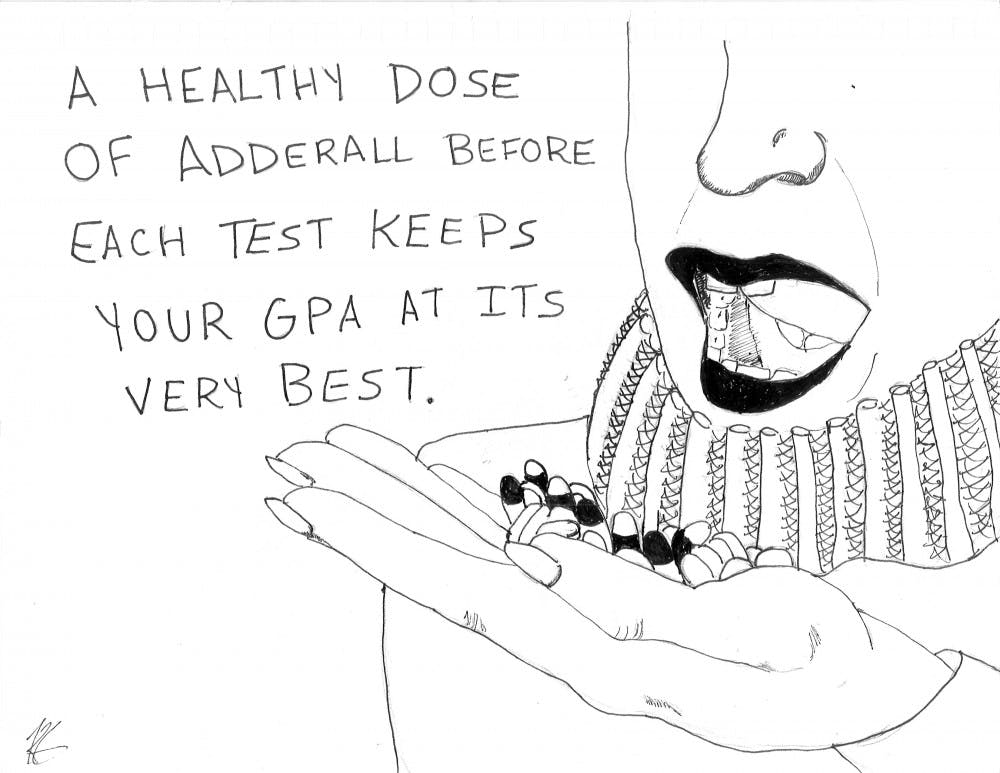Any resourceful college student is capable of getting their hands on drugs and alcohol, whether legal or not, so the accessibility of illegal substances is not a concern. It is what these substances are used for that ought to be examined, especially in the academic world.
Performance-enhancing drugs are responsible for a large number of ethical dilemmas taking place in professional and college-level sports. It is both illegal and considered unethical, giving individuals an unfair, physical advantage over other players participating in the sport.
However, the use of medication to excel in academics, especially for college students is overlooked. Most don’t take into consideration that the use of drugs for academics closely parallels that of the sports industry.
According to the Huffington Post, college students nationwide have begun to take Adderall and Vyvanse, common prescription medications used to treat ADHD, to complete schoolwork. These prescription meds allow student to maintain acute focus for a longer period of time, which is enough to entice any stressed, overburdened college student.
However, most are unaware that they are classified in the same category of drugs as cocaine and morphine and are considered to be some of the most addictive forms of prescription medication.
There are a variety of ways one can get their hands on these dugs. In a study conducted by The Times, a large portion of the participants reported that they lied to their doctor about being excessively distracted and anxious. Similarly, a Michigan State study indicated that over 900,000 individuals in the U.S. could have been misdiagnosed with ADHD within one year.
An even larger percentage of participants claimed to have received these pills from friends or acquaintances who were selling or distributing their own prescribed medication.
A survey conducted in a Minnesota high school shows a similar trend. About 89 percent of the students claimed to know someone taking unprescribed Adderall. It is not surprising then then that Adderall has was pegged as the most “abused prescription drug in America.”
Some individuals, such as Anders Sandberg, Ph.D, of Oxford University’s Future of Humanity Institute, would argue that these prescription drugs are really no different from drinking coffee or alcohol and that their use is not unethical. Caffeine, after all, gives people the energy to stay awake and maintain focus, while alcohol “calms nerves” and sustains creativity.
The public’s perception of the use of these drugs parallels this belief. In a Washington University study, college freshman males were surveyed to determine their views on drug use in sports and in academics. They were given two scenarios, one in which a person uses drugs to perform better in track and one where a person uses ADHD medicine to perform better in school. Almost all the participants found only the first scenario to be unethical.
It is clear that using unprescribed performance enhancing drugs are not perceived to give people an unfair advantage in the academic community, but this logic discounts that taking these drugs is illegal for a reason. Building up a tolerance or an addiction to such drugs is guaranteed to inhibit students in the future, forcing their bodies to depend on these drugs to focus.
"There isn't a perceived risk factor for taking these medications without a medical need and that can and has led to medical emergencies that could be life threatening," April Rovero, executive director of the National Coalition Against Prescription Drug Abuse, said.
This illegal act has yet to be considered taboo by the public although it should be. These performance enhancing drugs are no different from those used in sports; college is also a competitive atmosphere that ought to be available only to those who can handle it, without the additional assistance of illegal, unprescribed medication.
Reach the columnist at ghirneis@asu.edu or follow @ghirneise2 on Twitter.
Editor’s note: The opinions presented in this column are the author’s and do not imply any endorsement from The State Press or its editors.
Want to join the conversation? Send an email to opiniondesk.statepress@gmail.com. Keep letters under 300 words and be sure to include your university affiliation. Anonymity will not be granted.
Like The State Press on Facebook and follow @statepress on Twitter.




